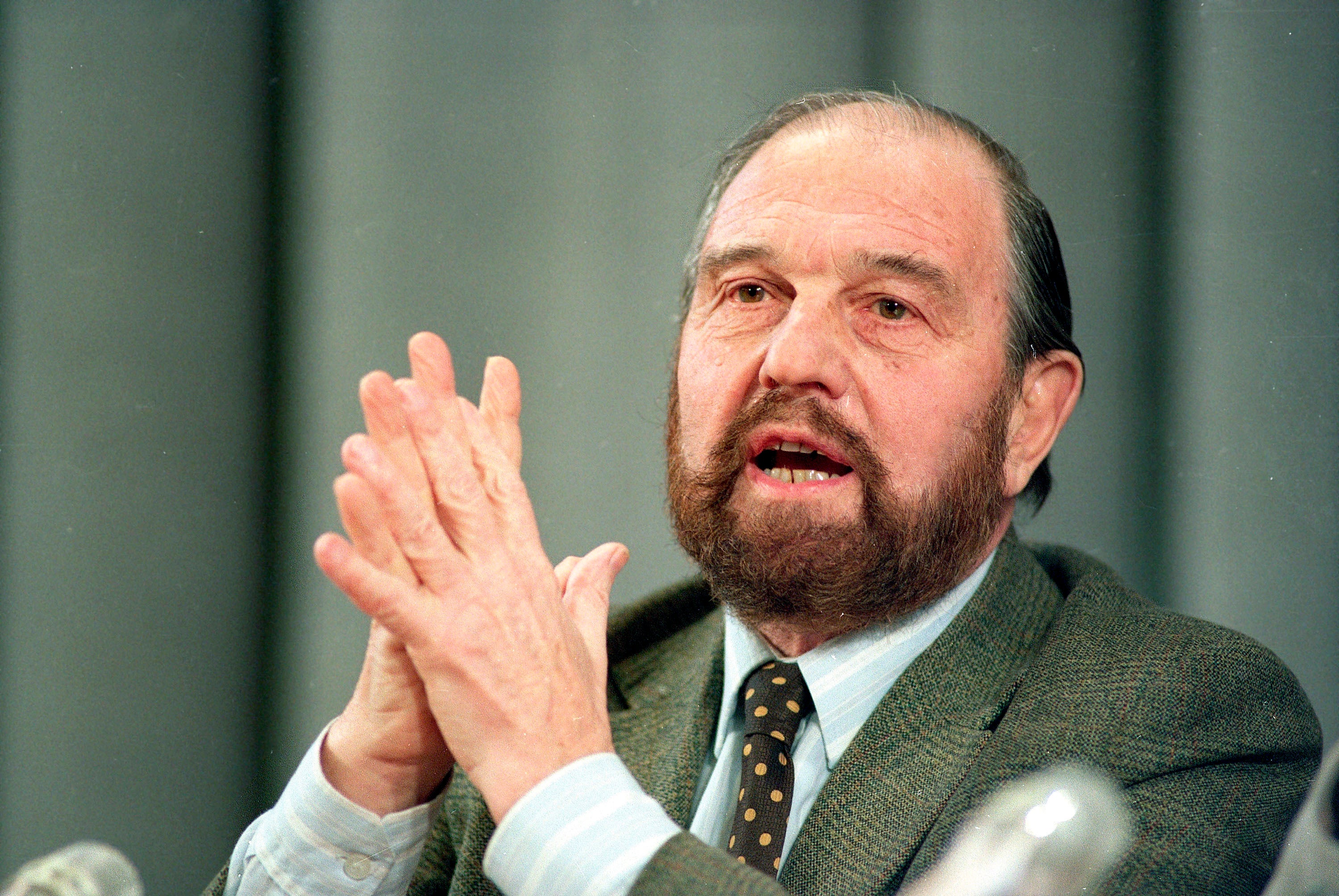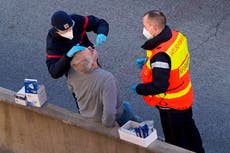George Blake: The last of Britain’s ‘ideological’ double agents who retained faith in communism to the end
The spy served in the Secret Intelligence Service (or MI6) from the early years of the Second World War until his unmasking as a Soviet informant in 1961

He was the last of Britain’s “ideological” spies, who worked for the Soviet Union not for Stalin’s shilling, but because of a belief in the rightness and ultimate victory of the communist cause.
George Blake was less famous than Kim Philby, Donald Maclean and Guy Burgess. Yet he ranked in importance with any member of the “Cambridge ring”.
Unlike the latter, moreover, he retained his faith in communism until the end, decades after the Soviet Union had disappeared.
Blake served in the Secret Intelligence Service (or MI6) from the early years of the Second World War until his unmasking as a Soviet double agent in 1961.
In his eight years as a spy for the KGB, he wrought untold damage, especially during his posting to West Berlin between 1955 and 1959, where his official job was to recruit Soviet agents for SIS.
Instead, he betrayed to the Russians the existence of Operation Gold, the tunnel under East Berlin that enabled Britain and the US to intercept Soviet military communications in their sector of the divided city.
Even more damagingly, he handed over the names of scores – perhaps hundreds – of British agents, some of whom were almost certainly executed.
The identification of SIS agents gave the Russians a massive boost in their own counterintelligence operations. Blake, for instance, must have informed the Russians that Rory Chisholm, one of his colleagues in Berlin, worked for SIS.
That information probably helped seal the fate of Oleg Penkovsky half a dozen years later, when Chisholm was sent to the British embassy in Moscow to run arguably the most valuable Soviet spy ever recruited by the west.
“Much worse than Philby,” Sir Dick White, the then head of SIS, remarked grimly when he was told of the case against Blake.
The suspected spy was unmasked by a tip from a defecting Polish intelligence officer who told the CIA that two Soviet agents were operating in Britain, one at a royal navy research centre, the other in SIS.
They were codenamed Lambda-1 and Lambda-2. Quickly, Lambda-1 was identified as Harry Houghton, but it was months before Blake, then on temporary assignment in Lebanon to learn Arabic, became the prime suspect for Lambda-2.
But the case was not watertight. Blake was recalled to London, ostensibly for discussions about his next posting, in fact for an interrogation aimed at securing a confession.
The task was entrusted to Harold Shergold, the top Soviet specialist in SIS (and who the same year would be Penkovsky’s senior case officer in London). But even Shergold had trouble breaking down his man.
After three days of questioning at an elegant SIS apartment in Carlton Gardens in April 1961, Shergold was close to giving up when he made a last despairing thrust.
British intelligence now knew he had spied for Russia, he told Blake, but understood that he had been blackmailed and had had no choice.
Until then the suspect had denied everything, but suddenly he snapped. No one had tortured him or blackmailed him, “I approached the Soviets and offered my services of my own accord.”
The truth was out, and the British could only measure the scale of the disaster. Unlike the Cambridge spies, Blake was anything but a product of the establishment.
He was born in Rotterdam with the name of George Behar. His mother was Dutch, his father a Spanish Jew who had lived in what was then Constantinople, and who had earned British citizenship by serving in the British army in the Great War.
He passed on the citizenship to his son, whom he named after King George V. As a child however, Blake never even visited Britain, living first in Holland and then with relatives in Cairo after his father died in 1934.
But that cosmopolitan existence was shattered when war broke out in September 1939. Blake was on holiday with his mother back in Holland and the family decided to stay. Eight months later, the Nazis invaded, and by 1941, the half-Jewish subject of His Majesty, aged just 18, was already working as a courier for British intelligence in occupied Europe.
Finally in 1942 he made it to Britain proper for the first time, and was formally recruited into SIS. When the war ended, Blake was sent to Berlin to try to find agents in what was already, in fact if not in name, East Germany.
He performed well and was brought home to go on a Russian course before being despatched to Seoul in 1950, to set up an anti-Soviet operation on Moscow’s eastern flank.
But all these designs were halted when the North Koreans invaded the South and Blake, like many other western diplomats, was interned – and during his three-year period of captivity he changed sides.
George Blake was no “Manchurian Candidate”, tortured and brainwashed into working for the communists while a prisoner of war. it was, he insisted, the spectacle of a helpless civilian population being attacked by mighty US bombers that had changed his world-view: “It made me feel ashamed of belonging to these overpowering, technically superior countries fighting against what seemed to me quite defenceless people.”
He quietly informed his KGB captors that he was ready to work for them. In 1953, Blake and his fellow detainees were at last released and he returned to London as an SIS hero.
Six weeks later however, he made contact with Nikolai Rodin, the then KGB rezident in London. To Blake he was “Sergei”, and Rodin would be his handler until he was posted to Berlin for the second time, in 1955.
The tale of George Blake is one of British intelligence’s greatest serial disasters. The disasters started with the quite laughable vetting that followed Blake’s imprisonment – a clearing interview in 1953 that lasted all of two hours. Blake’s knowledge of languages and his cosmopolitan background were simply assets that blinded SIS to the risks of a man whose ultimate allegiances were always murky.
How could he have been a traitor, he argued years later. “To betray, you first have to believe, and I never believed.” His arrest, of which the Americans had to be informed, was a further profound embarrassment to a service desperately trying to rebuild its credibility after the Maclean/Burgess/Philby fiasco.
The Blake affair undid most of these efforts, and also helped cement the mole-hunting obsession of James Angleton, the CIA’s then counterintelligence chief, whose paranoia would wreak turmoil in the US spy agency.
Blake had to be prosecuted, but a public trial would be desperately damaging. To the relief of the authorities, he agreed to plead guilty, and at a short hearing on 3 May 1961 he was sentenced by Lord Chief Justice Parker to a prison term of 42 years – a year, it was said at the time, for each of the British agents he had betrayed.
The severity of the sentence, the longest ever handed down for espionage by a British court, was stunning. In the event, however, he spent just five years in Wormwood Scrubs.
On October 22 1966 came the final humiliation of SIS, as Blake escaped from what was supposed to be a maximum security prison, with the help of three fellow inmates, an Irish hellraiser called Sean Bourke, and Pat Pottle and Michael Randle, both jailed for civil disobedience.
A day earlier 142 people had died in the Aberfan mining disaster, and Blake’s escape attracted relatively little attention. But it was an indelible display of British incompetence.
The authorities tried to blame the debacle on the KGB, but there has never been the slightest evidence that Moscow had a hand in proceedings, or that Blake was quietly “swapped” for one or more captured British agents.
Instead, he was hidden in west London by Pottle and Randle, before being spirited in a caravan to East Berlin and safety. Once in Moscow, he was rewarded by the KGB with a spacious rent-free flat, a dacha on the capital’s outskirts, plus what was a handsome salary in Soviet terms.
By the standards of exiled spies, Blake’s story had a happy ending. He remarried (his British first wife, unsuspecting of his double life, had divorced him when he was sent to jail.)
His second wife Ida, bore him a son Mikhail. Having had less to with Britain than Philby, Burgess and Maclean, he missed the place less they did – and after Wormwood Scrubs, the material deprivations of Moscow must have been small penance.
Later he would re-establish good relations with his three children by his first marriage. Blake became a fluent Russian speaker, lecturing aspiring spies at the KGB; for many years he spent two or three days a week at Moscow’s Institute of World Economics and International Affairs, where Donald Maclean also taught.
For his spying services, he was awarded the Order of Lenin and Order of the Red Banner. He took no British newspapers but kept in touch with international affairs through the BBC World Service. In his slightly accented English, he gave the odd interview to the British and American media, betraying none of the bitterness that marked the Cambridge refugees.
He and Ida were on good terms with Philby and his Russian wife Rufina. But he was especially fond of Maclean, whose commitment to communism, for all the disillusions, was closest to his own. When he died in 1983, Maclean bequeathed to Blake his library.
Both men shared a streak of asceticism and idealism. Throughout his life, Blake was fascinated by religion. Growing up in Holland, he had been strongly influenced by Calvinism and at one point seriously considered becoming a priest. He was always inclined to the theory of predestination, a belief that Marxism would only strengthen. Hence perhaps the title of his 1990 memoirs, No Other Choice.
The book sold well, but provoked a long dispute in Britain over whether Blake was entitled to any of the royalties. In Moscow, however, there was never any argument about his standing.
During a Russian television programme to celebrate Blake’s 80th birthday in November 2002, Lt General Leonid Shebarshin, the former head of Soviet foreign intelligence, heaped praise on his prize double agent. Blake, he declared, was “an example for all intelligence agents over several generations”.
And the spy too repaid the compliment, going to his grave convinced that communism might yet succeed at some future point in human affairs. It was, he declared towards the end of his life, “a great experiment that deserved to succeed, but did not as a result of human frailty”.
George Blake, spy, born 11 November 1922, died 26 December 2020
Rupert Cornwell died in 2017
Join our commenting forum
Join thought-provoking conversations, follow other Independent readers and see their replies
Comments






Bookmark popover
Removed from bookmarks